- Home
- Michael Dobbs
The Edge of Madness Page 7
The Edge of Madness Read online
Page 7
Opposite him sat another of her aides, who was cast from an entirely different mould. Marcus Washington was here almost under sufferance. He disliked small talk and had little interest in the nature of food; he survived on a diet of ideas and argument and seemed to have need for little else. He sat passively, resisting the offer of conversation from those around him, and when a freshly grilled trout was presented to him he set about it with a notable lack of interest. He didn’t finish it, leaving the remains stranded on the side of his plate. Washington was her National Security Advisor, an academic, an intellectual (she was careful not to confuse the two), and a regular pain in the butt. Sometimes he treated her almost as a bus driver with whom he’d hitched a ride, a man who would decide for himself where and when he would get off, one who gave the impression of travelling with her not from any sense of loyalty but merely out of curiosity. Yet it was his sense of curiosity that made him so valuable; he took nothing for granted, probed deeper than the rest, and stripped every argument of emotion and irrelevance. Once, in the middle of a confrontation in the Oval Office, he’d told the Secretary of State for Defense that taking advice from him was like taking a suppository; it gave him an attack of the shits. His exact words. Not one who spent much time buffing backsides, was Marcus. And yet she couldn’t throw him off the bus. He cut through tangled knots with a sharper mind and keener eye than anyone. She would need his talents, more than ever, in the next couple of days.
As the meal progressed, Blythe fell into distraction. They were fiddling while Rome was about to burn. When the fruit arrived, on plates that had been hand-painted by Landseer, she decided the time had come, the moment to make her move. The others continued with their meal, but she put aside her fork and spoon.
‘Is everything all right?’ Elizabeth enquired, as the room grew quiet.
‘I’m not sure. A virus I’ve been carrying, a reaction to my mother’s funeral, perhaps.’
‘Then you must rest.’
‘Would you mind?’
Immediately good, loyal Warren had jumped to his feet in concern.
‘No, no, I’ll be fine,’ she insisted. ‘If you’ll all excuse me.’
And the others rose to their feet, too, all except for the Queen. Blythe looked towards her hostess, who nodded. And it had started.
Elizabeth knew, of course, that the illness was feigned, was merely a pretence that would keep the most powerful politician on earth out of sight for the next couple of days without too many people asking questions. Not a word must get out, no suggestion made that she was anywhere other than tucked away and carefree in the Scottish countryside. The timing of this visit to Balmoral had been fortuitous, no one could have known that it would coincide with a moment of looming disaster, but you rode your luck when it trotted by, and Blythe hoped desperately that the luck might last. She had been told that war was about to break out. It didn’t get more serious than that. Yet as she made her way to her room, she had no way of knowing that the war had already begun.
Early Friday morning. Beijing.
Something was stirring. Perhaps this wasn’t evident to a casual observer but in the People’s Republic of China, a land where Communism has held sway for more than sixty years and rigid custom for many lifetimes more, even a raised eyebrow or a sleeve tugged in impatience can betoken a change that might stir the entire world. And there were many raised eyebrows in Beijing that morning. During the night, a change had taken place that was far from subtle. First light–or what passed as light in that smog-crippled city–revealed that troops had taken up position outside many important buildings and at major traffic intersections. Not vast numbers of troops, for ostentation wasn’t the Chinese way, but a guard of the People’s Liberation Army had replaced the police who were normally on duty at the capitol’s significant points, and larger contingents of troops could be spotted peering out from the side streets off the Avenue of Eternal Peace. They could be found outside many public buildings, and a couple of armoured personnel carriers were stationed as discreetly as these things could be in one corner of Tiananmen Square. Rumours began to circulate that a convoy of tanks was moving up on the railroad from Shanghai.
The troops didn’t disrupt the normal life of Beijing–there seemed to be a conscious effort not to provoke alarm–but troops hadn’t been deployed on the streets since the Tiananmen Square uprising twenty years earlier. No one needed to start casting joss sticks in the temple to know that the wind had shifted and was freshening sharply.
There was something else. These troops weren’t from the regiments of the 38th Army, the local garrison, but from much further afield, some even mountain men from the Szechwan region in the south. Different dialects, different spices, different lifestyles, and that suggested different loyalties. These strange troops from distant parts even took up position outside the headquarters of the Beijing television service–it wasn’t particularly their number that gave rise to comment, but simply the fact that they were there at all. Unmistakably, during the night, the military had placed its hand around the heart of China.
A new wind was most definitely stirring. The people of Beijing scurried on their way, heads low, wondering if this new wind might yet rise to gale force.
Thursday night. Somewhere over the polar ice cap.
The Bear, with its four mighty turbo-prop engines that drove eight contra-rotating propellers, clawed its way through the thin air at more than three hundred miles an hour. It was a noisy craft and had never been intended for comfort; its strengths lay elsewhere. The first Bear had flown fifty years earlier, it had survived the test of time and Cold War, and its modern variant could fly for ten thousand miles, stay aloft all day and then all night, and was able to cause countless kinds of havoc with its twenty-ton payload of bombs and missiles. Yet it had been a while since those missiles had been launched in anger, and for the most part nowadays the Bear was used for reconnaissance, to test the reactions and the resolve of others, nudging up against their controlled airspace to see how quickly tomorrow’s potential enemies might get off their arses and respond. So when the Bear took off and headed towards the polar ice cap before turning onto a flight path that would bring it close to British airspace, none of those watching these manoeuvres on the radars of various powers saw anything out of the ordinary. Neither had anyone noticed anything untoward when, moments earlier, Rossiya-1 had lifted off from Sheremetyevo on its declared journey to Archangelsk. Everything was as expected.
They were flying at thirty-six thousand feet. Shunin had his eyes closed, pretending to sleep while trying to find what comfort he could in one of the flight engineer’s chairs. An oxygen mask was beside him, just in case, as was a tumbler of Russkiy Standart thoughtfully provided by Boris Abramovitch and cooled to near freezing in some part of the bomb bay. The truth was that Shunin preferred bourbon to vodka but there were limits, even to a president’s freedom. A man who had made his reputation standing up to America and browbeating his former Soviet neighbours couldn’t allow himself to be accused of letting the Fatherland down. So many had, of course. They’d allowed Russia to become weak, left her flat on her back, waiting to be taken advantage of by Western businessmen, and now it was necessary to remind the world that Moscow had once been–and was again–a force to be reckoned with. The collapse of the Soviet Union had caused much crowing in Western capitals; in more recent times it had been both his patriotic duty and considerable personal pleasure to remind them that cock stew was one of Sergei Illich Shunin’s favourite dishes.
His leg had gone to sleep. He shifted, aching. He understood that American bombers were more comfortable. How many years would it be, he wondered, before Russia caught up? How long before Ilyushin made an airliner with as much appeal as an Airbus, or Chaika a car that could last as long as a Volvo? And how much longer before Chechnya produced a man who wanted anything other than to slit Russian throats? Screw them. But he would sort it out, all of it, if God gave him time.
Thoughts of mortality had grown insist
ent in recent days, along with his shortness of breath. He was no fool, never that, he knew he wouldn’t last forever. Someday they would get to him, and he would find himself on the wrong end of a bullet, just like Yuri Anatolyevich. He wouldn’t deserve it, but neither had Yuri Anatolyevich, perhaps. And yet it was also possible that his death had been supreme justice, for there could be no more than six men who could have told the bombers of his plans and Yuri Anatolyevich was one of them. Had been one of them. One less suspect, one less thing for Shunin to worry about, and on that basis alone it had been a worthwhile death. A Russian death. Yet there were so many things for him to worry about.
What would happen after he had gone? Through half-closed eyes he examined his son-in-law once again. Lavrenti sat in his own chair on the other side of the cabin, lost in his own thoughts, drinking perhaps a little too much, occasionally drumming his fingers in impatience. Better in impatience than in thrall to that crap-encrusted music. Always in a hurry, was Lavrenti, which was why Shunin had to keep him pinned down, but it wasn’t a grievous fault, the desire to get on. Shunin wanted a strong man to follow him, someone who could protect his legacy and everything he had achieved. Protect his family, too. Who better, perhaps, than Lavrenti? If only he could find better judgement, not just in music but in his friendships, and not get himself too deeply involved with rootless media men and cowboy contractors. He still had a lot to learn, but that was one of the reasons why Shunin had brought him along on this trip, to be taught. And to be tested.
The President stirred, glanced at his watch. It was time.
‘Tell Boris Abramovitch I want to see him,’ he instructed Lavrenti, almost shouting to make himself heard above the noise of the engines. For once Lavrenti didn’t ask questions, he hadn’t spoken much at all since he’d seen his father-in-law kill those two men. He unbuckled his safety harness and did as he was told.
Soon, Boris Abramovitch Bulgakov appeared from the direction of the cockpit. He was a taciturn man of intense loyalties and few words, which made him excellent in general and ideal for this task. He was in command but not the pilot on this flight–it had been almost ten years since he had last flown a Bear in military service–so he had stood in for the co-pilot on this mission, taking the second seat, although no one on board questioned his authority.
‘Boris Abramovitch, you’ve done well. But I have new instructions for you.’ The President handed across a sheet of paper. The pilot read it and couldn’t disguise the astonishment in his eyes. He scratched himself, then read it once more, very carefully.
‘But, Mr President, if I follow these instructions, no one back home will know…’
‘Precisely.’
‘Forgive me, Mr President, but you must understand that there are dangers in what you propose.’
‘God has spared me once today. I’m gambling He’s in no hurry to change His mind.’
‘You will need a tight belt. It will not be a comfortable flight.’
‘Then I’d better leave nothing to spill,’ Shunin replied, draining his glass. And nothing to chance, either, he muttered, reflecting that Boris Abramovitch, too, was one of those six–no, make that five–suspects.
CHAPTER FIVE
Thursday night. Buckinghamshire.
Darkness was falling as Harry and Mark D’Arby drove away from Chequers in what amounted to disguise–a dusty six-year-old Range Rover with a parking dent on its front wing and the interior infused with the dull smell of cigarette ash. The air con didn’t work and they had to lower the windows to allow the inside to cool down as they drove through the avenue of beech. It was a private vehicle, borrowed from God knew where, not one that came from the official pool, and it lacked armour, communications gear, sat nav, had none of the usual Special Branch presence and didn’t even have a tracker device–which was part of the point, so D’Arby had half-explained in his mysterious you’ll-have-to-guess-the-rest manner. Harry was driving, the Prime Minister slumped in the seat beside him, apparently slumbering, hidden beneath a hat as Harry was waved through the checkpoint at the gates. The policemen were relaxed, they were looking for madmen sneaking in, not escaping. The two men pressed on into the enfolding gloom and were soon lost to sight.
‘So where are we headed, Mark?’ Harry asked as, under D’Arby’s direction, he drove through the darkening Buckinghamshire countryside.
‘Scotland.’
‘What? You’re kidding. That must be the best part of four hundred bloody miles! At this time of night?’
‘Why do you think I asked you?’ D’Arby replied, a grim smile flickering in the headlights of an approaching car. ‘Need you to share the driving. And you can hardly expect me to get out and pay for the petrol.’
‘I think you’ll find it’s diesel.’
‘Then my point is made.’ Suddenly D’Arby realized that he hadn’t filled up a car in more than three years, hadn’t cooked a meal, bought a train ticket, spent a lazy half-hour lingering over the sports page, and as for sex, well…Perhaps that was one of the reasons why he was more than a little envious of Harry and his freedom. ‘And it’s four hundred and seventy-six miles, to be precise.’
‘Couldn’t we fly? Use a chopper?’
‘And leave our footprint all over the map?’ The Prime Minister shook his head. ‘The technology’s available nowadays to track not just planes and helicopters but every car on the road. Surveillance isn’t something you leave behind in the High Street, it covers every part of the world and in astonishing detail. That’s why we’re using this shitheap of a car–no one will suspect it’s us. And that’s why I made you leave your mobile phone behind. You know they can track those bloody things to within three feet, even when they’re switched off?’
‘Is that what the Chinese are doing?’
‘Possibly. Can’t know for certain, and can’t take the chance. Right now we’re targets, Harry, and that’s why we must hide.’
Harry slipped through the gears as they navigated past yet another of the interminable roundabouts on the A41. He cast a glance at his companion; in the light of the street lamps his face looked stiff, drained, like a wax mask.
‘Where the hell were you in the Sixties, Harry?’ D’Arby started up again. ‘Oh, forgive me, bloody stupid question. You were scarcely born even when they finished. But I’m a full-blown child of that era, that’s me. They always say it leaves a mark.’
‘Too much flower power and free sex.’
‘In all honesty I was still a little too young for all that. Tried to make up for it later, of course.’
‘Some of us still are.’
‘So I hear.’
‘Tell me you’re not going to lecture me about my sex life, Mark.’
‘No, not tonight. Not this trip,’ D’Arby replied, his voice wistful. ‘Instead I’m going to give you a little lecture about Mr Mao Yanming.’
‘The One-Eyed Bandit of Beijing.’
‘The very same. He was a child of the Sixties, too, you know. One of Mao Zedong’s little red warriors during those years of madness they called the Great Proletarian Cultural Revolution.’
It had been one of those seminal moments in history that left scars on everyone. A decade of madness, great only in the extent of its destruction, proletarian only insofar as its miseries were shared by almost all, there was nothing in any respect cultural about its savagery and if it was a revolution it was of the most exceptional kind, since it had been started by the man who was already in charge. A total dictator and a revolutionary to his core, Mao Zedong had imposed policies that even at the time many people thought were signs of insanity. In the pursuit of perpetual renewal he had decided not so much to shake up the country as to kick it to pieces by questioning everything and everyone, and for that task he had set loose millions of young people known as his Red Guards. Armed with little more than printed copies of Chairman Mao’s rambling thoughts and their overwhelming numbers, they’d ransacked the country, bringing industry to a halt, ritually humiliating and often execut
ing anyone in authority, marching the country back towards the Stone Age. ‘Let a hundred flowers bloom, let a hundred schools of thought contend,’ Mao had preached, but the flowers had been pulled up by their roots and the schools had soon been destroyed. It had turned into nothing but an excuse for the humiliation of an entire generation of Chinese leaders. Academics were dragged from classrooms, accused of thought crimes, beaten by mobs, and sent to the countryside to work in the paddy fields, where many of them sank without trace. Generals were tried in front of their troops and banished. Senior politicians around Mao disappeared; some committed suicide, while Lin Biao, his heir apparent and publicly proclaimed ‘closest comrade in arms’, was killed when his plane mysteriously fell out of the sky while he was trying to flee to the Soviet Union. The Cultural Revolution was an inferno, sparked by one old man and fanned into uncontrollable life by millions upon millions of teenagers. In the West the youth of that time smoked dope, practised desperately unsafe sex, and clung to the thoughts of maharishis and John Lennon, while in the East they washed in blood as they chanted the name of Mao Zedong.
Now there was a new Mao. Yanming. It was clearly an adopted name. Yan conveyed the meaning of someone strict or stern, Ming that of something brilliant or explicit. In other words, one tough Chinese cookie. He was a man who had changed his name, and now wanted to change his country.
‘We know so little about the man, Harry. I’ve never met him, very few Western leaders have. He’s an ardent nationalist, dynamic, radical, brutal. Truth is, we know next to nothing about him until he emerges as a Red Guard from the mess of the Cultural Revolution. For his sins he gets himself banished to the desert with orders to make it bloom. Almost starves to death, loses an eye, and gains a streak of single-minded bloody ruthlessness. Ten years later he reappears and starts going through the system like a bad oyster. Then, as world energy prices soar, so does the cost of basic foods and suddenly the Beijing economic miracle begins to lose its gloss. Very privately, because that’s how things always happen in China, the government begins to panic. A billion Chinese start asking why five per cent of their fellow countrymen are living in the lap of luxury while they’re coughing up their guts after working eighty-hour weeks in the inundation of filth that passes as their local factory. So the Politburo pick on Mao to take over–partly because he’s a bit of an outsider, largely perhaps because they need someone new to shoulder the blame. But he grabs the whole thing by the balls and announces that he hates bloody foreigners. Gives the country something new to talk about.’

 Last Man to Die
Last Man to Die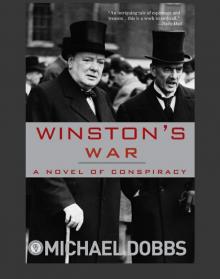 Winston's War
Winston's War The House of Cards Complete Trilogy
The House of Cards Complete Trilogy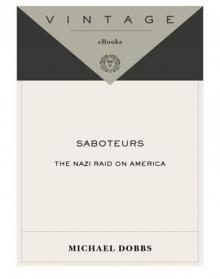 Saboteurs
Saboteurs The Touch of Innocents
The Touch of Innocents WC02 - Never Surrender
WC02 - Never Surrender Old Enemies
Old Enemies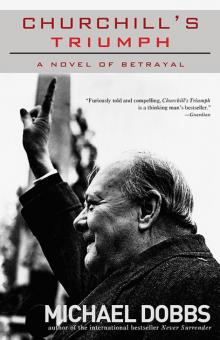 Churchill's Triumph
Churchill's Triumph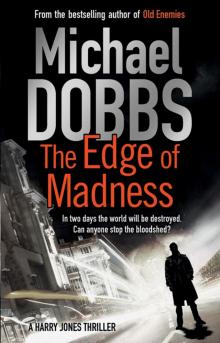 The Edge of Madness
The Edge of Madness Goodfellowe MP
Goodfellowe MP The Final Cut
The Final Cut Whispers of Betrayal
Whispers of Betrayal Churchill's Hour
Churchill's Hour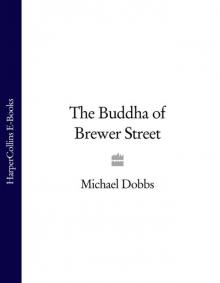 The Buddha of Brewer Street
The Buddha of Brewer Street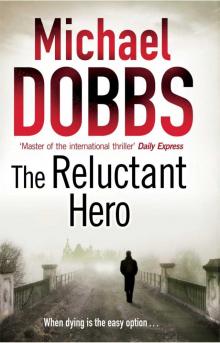 The Reluctant Hero
The Reluctant Hero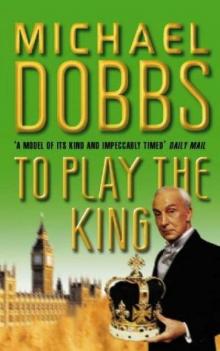 To Play the King
To Play the King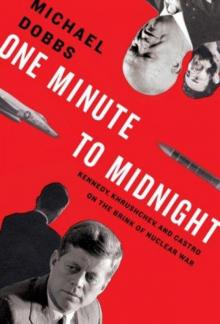 One minute to midnight
One minute to midnight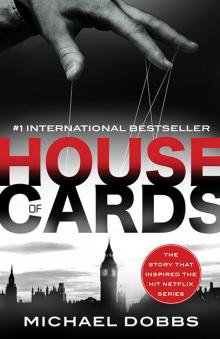 House of Cards
House of Cards The Lords' Day (retail)
The Lords' Day (retail)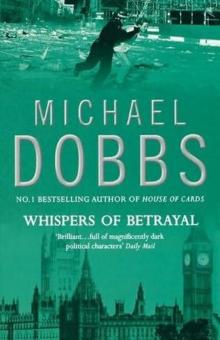 Whispers of betrayal tg-3
Whispers of betrayal tg-3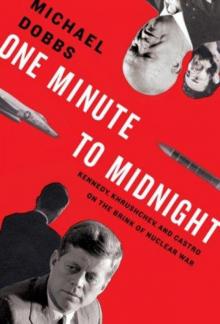 One minute to midnight: Kennedy, Khrushchev, and Castro on the brink of nuclear war
One minute to midnight: Kennedy, Khrushchev, and Castro on the brink of nuclear war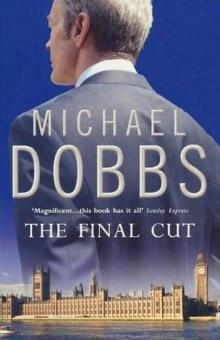 The Final Cut fu-3
The Final Cut fu-3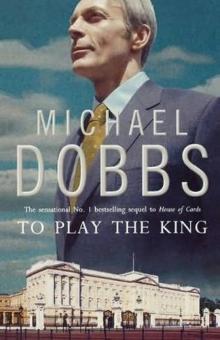 To play the king fu-2
To play the king fu-2 A Ghost at the Door
A Ghost at the Door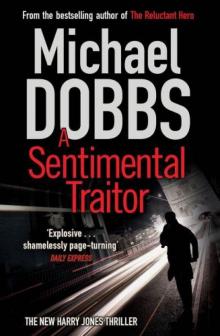 A Sentimental Traitor
A Sentimental Traitor